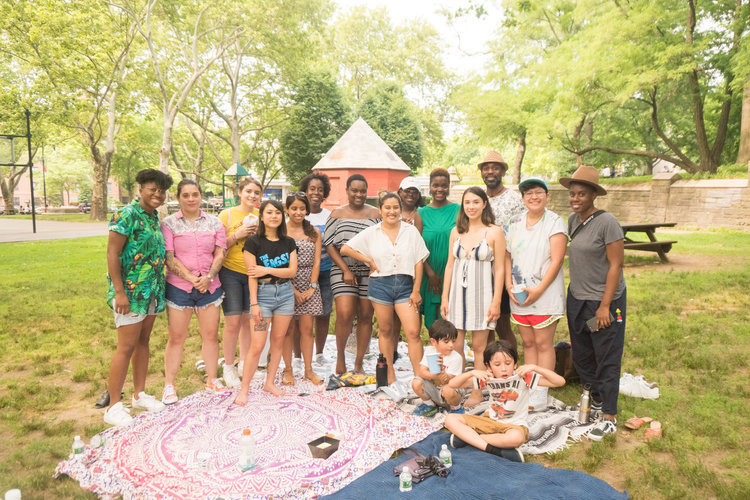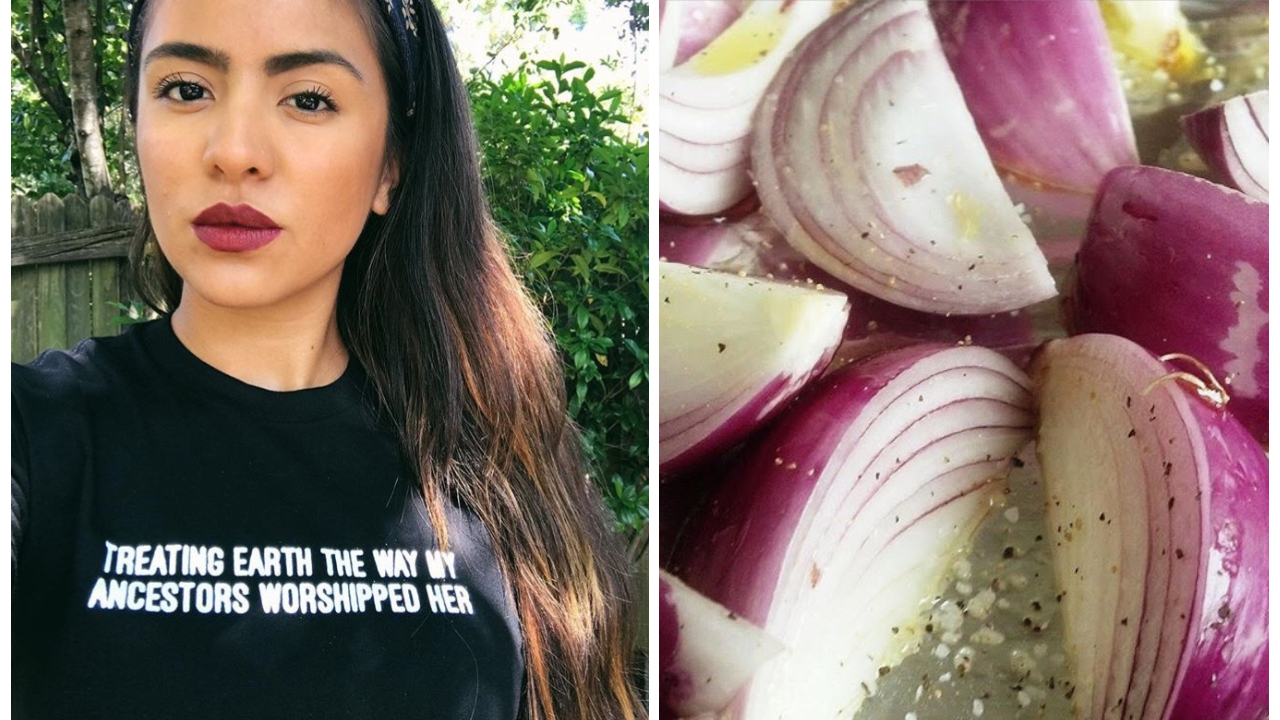Launched by New York-based activist and writer Amy Quichiz in February, Veggie Mijas is a WOC-run vegan collective fighting for food justice and animal liberation. Through community-driven events and social media, Veggie Mijas applies the principles of intersectionality to veganism; the collective questions how being brown, Latinx, non-binary, womxn, queer, genderqueer, or coming from a working class background impacts what we consume.
Quichiz chooses a vegan lifestyle because she believes that a healthy relationship with food is one in which she doesn’t feel guilty about what she’s eating. “Knowing that I am doing good for the environment, the animals, and not allowing capitalism and large food corporations to tell me what to eat — I feel like that is the ultimate revolution, ruled with compassion for all beings,” she says.
With seven chapters across fifteen states including New York, California, New Hampshire, Florida, Pennsylvania, Illinois, and Washington DC, the collective is growing quickly while also creating spaces where womxn/folks can share recipes and talk about how being vegan connects them to their ancestral roots.
i-D spoke with Quichiz about how Veggie Mijas is making veganism more accessible, why we should take an intersectional approach when it comes to eating, and what it means to decolonize our food.

What kind of activities does Veggie Mijas organize?
We have so many different events and activities. In New York City alone, we’ve had meet-ups in several POC-owned restaurants that are either vegan or have vegan options, yoga classes taught by a Dominican instructor, and even farm sanctuary trips to Woodstock. We’ve also organized traditional cooking classes with an Afro-Dominican instructor, helped remodel a garden, and we had a herbalist show us how to plant different herbs.
In Los Angeles our chapter taught women that have been in domestic violence situations how to have tough conversations about eating disorders or food throughout the holidays. In Miami we cleaned the beach and talked about the importance of zero waste. We believe that learning how to plant our own food, being in touch with Mother Earth and her dirt, learning how to cook traditionally, and eating together is what makes a community. All of our chapters are doing what they believe food justice looks like in their community.
How do you honor your cultural heritage through Veggie Mijas? How does this work connect you and other members with your ancestral roots?
When I came home during a school break, I opened my fridge and there was not a single thing in it that was vegan-friendly. I told my parents that I had recently gone vegan and a million questions proceeded from there: “Where are you getting your proteins?” “Who told you about this wild idea?” and so on. Later on, after showing them documentaries like What the Health and Earthlings, they started to see the truths behind the meat industry and what it is doing to our bodies. Little by little, the inside of our fridge started to look more colorful, until there was not a single dairy product in sight.
During the process of transitioning my home to be a more plant-based space, I brought home quinoa from Traders Joe’s and my dad started laughing. I asked why he reacted that way and we had a conversation about his food history. He told me he had eaten quinoa back in Peru when him and his family made no money. I found it interesting that something as simple as quinoa, which is seen as a “mother grain” in indigenous lands and something poor people eat in Peru, is something so expensive here in the U.S.
Many members of Veggie Mijas have a similar story. This collective helps us bridge our different cultures, but also helps others discover stories about their own countries. I honor my culture through Veggie Mijas by making radical spaces that help us do just that.
What can we expect from your Friendsgiving event? What do you plan to address about the problematic nature of Thanksgiving?
The Friendsgiving event is happening on November 24 through the Chicago Chapter, organized by Luisa and Araceli. Mazie, a trauma-informed yoga teacher, will be leading a breathing exercise, which will help relieve any anxieties about what that day means for indigenous communities. Organizers will recognize the land they are in, what kind of space they are taking up as non-indigenous folks, and have a family-style vegan potluck.
During this time, many turkeys are being slaughtered for a “holiday” that is clearly a genocide. On top of that, colonizers have taught us that the turkey should be the center of the dinner, when many indigenous communities honor turkeys. We will be addressing the fact that people have normalized this holiday, and how it should be reclaimed to honor indigenous resilience.
What’s the new zine all about? When is it released and where will we be able to find it?
I am currently putting together a zine called Casa Verde, meaning “green home.” The zine includes delicious recipes of traditional dishes from Colombia, El Salvador, Venezuela, Peru, Cuba, Dominican Republic, Puerto Rico, and Mexico, but veganized. In addition to including the necessary ingredients, instructions, and beautiful photography, it also tells the stories behind each woman’s contribution, their reason for being are vegan, and how we bridge the gap between our culture and veganism.
This zine is being illustrated by Victoria Lee, a Filipinx queer illustrator from New Jersey. For me, this project is really important because I see so many Latinx recipe books made by white people and it is time that we see our own representation, especially with plant-based recipes being shown next to our personal stories. This zine will be launching December 8 and can be found on our website. Eventually, it will be translated into Spanish. That way folks can share it with their family members as well.
What does it mean to decolonize one’s food?
I believe that decolonizing one’s food means to deconstruct what we already think we know. This process begins with asking a lot of questions about your own relationship with food and the backstory behind food and your family and ancestors. This journey looks very different for each individual, yet it allows us to critically think about what food means to us, where our food comes from, and what around us is influencing our food choices. I believe that decolonizing our foods is questioning our own traditions and finding the root of how our ancestors preserved this earth — as everyone should. One of the most important questions is, “What made you assume vegan food is for white people?”
How do you use vegan food as a way to tackle other social issues?
When you think about where slaughterhouses are located, they’re usually in predominantly Black and Brown neighborhoods. Whenever animal waste is distributed, all of the toxic chemicals and bacteria cause these people respiratory problems and many other health issues. Not to mention, the people that work in the slaughterhouses — they have significantly higher rates of violent arrest, alcoholism, domestic abuse, child abuse, and suicide. We must consider the traumas that come with slaughtering animals all day and what that does to a person.
Every issue comes back to conscious eating. Plastic being found in the ocean? Fishing nets create the biggest waste machine for the ocean but who is talking about not consuming seafood? Companies destroying the Amazons? Who’s talking about how palm oil companies destroy not only Amazons, but also kills the animals and the indigenous people that live within that environment?
How can we make veganism more accessible for the general public?
Many people genuinely don’t know where to start or think that being vegan is too much work, too expensive or too hard. I also think that people do not want to ask that many questions because they do not want to hear the truth. For our communities, I think that white veganism has made us not want to ask because we think it is a “white thing” or “trend.” Veganism can become more accessible through spreading more information about the truths of farm factories, farm workers, underpaid labor, and our unjust capitalist system and how it controls the foods we eat.
In order to make veganism more accessible in folks of color communities we must demand healthier options in our bodegas and neighborhoods. Unfortunately, I’ve seen too many times that the only reason why there is vegan cheese in my hood now is because gentrifiers moved close by. It is our responsibility to demand and to question why we do not have these options around us all the time. I also believe there is power in numbers. Find a community garden around you, get a group of friends together, and help plant or remodel the space around you. That invites community to see that there is food growing in their backyards, and makes it not necessarily about veganism but about the power of food that comes from a nearby ground.
